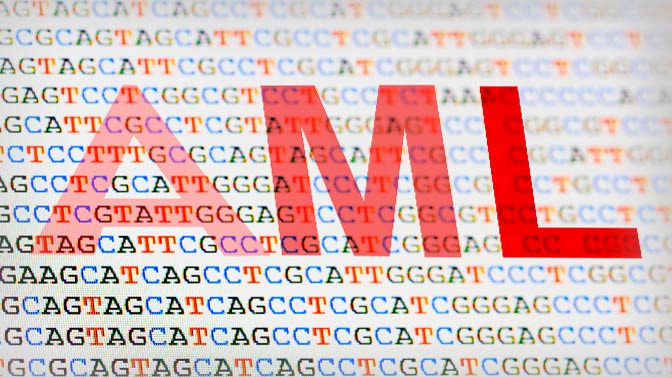
“As sequencing technologies become more affordable and accessible, they are revolutionizing how physicians monitor and treat cancer,” says Dr. Dennis Kim, a clinical researcher and leukemia specialist at University Health Network’s Princess Margaret Cancer Centre.
Dr. Kim is bringing this idea to practice. He recently led a study to explore the use of next-generation sequencing—the newest and fastest DNA sequencing technologies—to monitor the treatment of acute myeloid leukemia, the most common type of leukemia in adults.
The study findings describe a sequencing approach that can be used to identify leukemia patients who are at risk for relapse after they receive bone marrow transplants—and does so better than current approaches.
“Because leukemia occurs in the blood, getting a biopsy can be as convenient and simple as taking a blood sample. This is one reason why sequencing technology is particularly applicable to this disease,” says Dr. Zhaolei Zhang, one of the key collaborators on this study, and a Professor at the Donnelly Centre for Cellular and Biomolecular Research at the University of Toronto.
In the study, the team screened the genetic sequences of over 100 individuals with acute myeloid leukemia for mutations that are known to be involved in the disease. They did this at multiple points along the cancer journey: at initial diagnosis, before treatment, and at 21, 90 and 180 days after bone marrow transplant. They also collected samples yearly thereafter and at relapse.
While previous studies have shown that certain mutations can to help predict whether the cancer will relapse, this is the first study to monitor mutations using next-generation sequencing before and after treatment.
“In mapping how these mutations change with treatment, we found that 21 days after bone marrow transplant treatment is a clinically important time point. That’s because patients that we identified as ‘high risk’ using our sequencing approach relapsed soon after,” says Dr. Kim.
“At this time point, our approach could be used to identify which patients would most likely benefit from more timely and aggressive complementary chemotherapy in order to prevent relapse.”
This work was supported by the National Research Foundation of Korea, the Korean Ministry of Health & Welfare, the Natural Science and Engineering Council, the National Natural Science Foundation of China, the Leukemia and Lymphoma Society of Canada and The Princess Margaret Cancer Foundation.
Kim T, Moon JH, Ahn JS, Kim YK, Lee SS, Ahn SY, Jung SH, Yang DH, Lee JJ, Choi SH, Lee JY, Tyndel MS, Shin MG, Lee YJ, Sohn SK, Park SK, Zhang Z, Kim HJ, Kim DDH. Next-generation sequencing based post-transplant monitoring of acute myeloid leukemia. Blood. 2018 Aug 14. pii: blood-2018-04-848028. doi:10.1182/blood-2018-04-848028.

Dr. Dennis Kim (pictured), based at PM Cancer Centre, led the study, which was published in the journal Blood.

